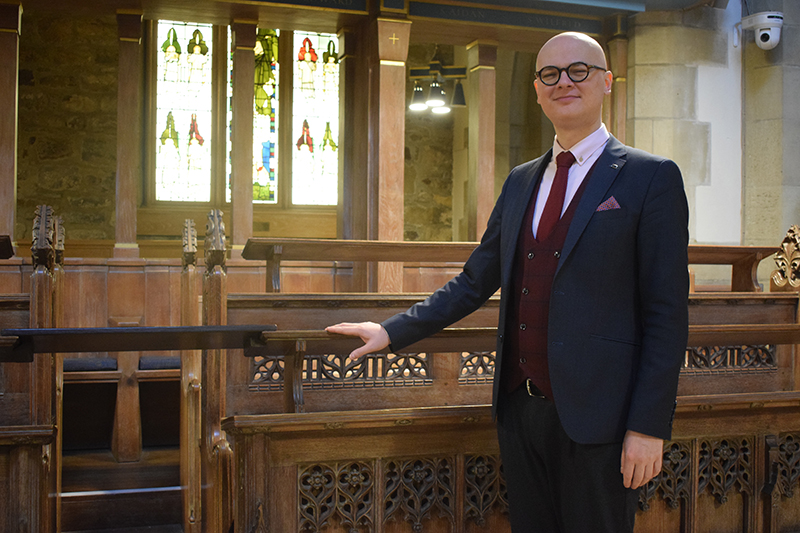On Wednesday 10th January we welcome Michał Szostak from Poland for our first organ recital of the new 2024 season. In this edition of ‘Notes from an Organist’ we discover more about them, and what to expect from their recital, including improvised pieces, working on a dissertation, and plans for 2024.
Could you introduce yourself, how you got into music / become an organist and your musical journey to where you are today?
My identity consists of a few components: a concert and church musician, a manager-practitioner, a university professor and a researcher. My musical beginnings were in a church choir, but I quickly moved into the organ field. I went through private organ lessons, schools, colleges, universities (Poland, Italy, the UK), artistic internships and master courses. My formal organ education led me to a DMA level in organ performance, and today I can share my experience during interpretation and improvisation courses in many countries, even in Africa.
What can people expect from your recital at Bradford Cathedral?
The clou of my recital is a mix of organ works, transcriptions, and improvisations. I think improvising is an excellent tool for a musician to communicate ideas to recipients. Also, a transcription of the famous Allegro con brio from Beethoven’s 5th Symphony can be an interesting and powerful part of the recital.
Why do you enjoy playing the organ?
An organ is an enormously versatile instrument that allows the performer to transfer moods, emotions, and universal values via the artwork (music piece or improvisation) to audiences. Every instrument is different, and every performance is created also by an instrument’s conditions, environment, and acoustics. Combining a well-sounding instrument and an inspiring (mostly sacral) interior lifts me to a high dimension of reality.
Do you have a particular favourite piece out of those you are playing?
No, I do not have particular favourite pieces to be played because many factors determine this issue: moods, inspirations, ideas, or needs. If I were to choose any particular area of organ music, improvising would play a crucial role in my repertoire. The style, form, or themes of improvisations are changing, but the form of creating and performing simultaneously gives me the most satisfaction and pleasure.
This season’s theme is ‘Trios and Trio Sonatas’ which features JS Bach’s six trio sonatas in full. Are you playing one and, if so, which one is it, why did you choose this one, and why are you looking forward to playing it?
I did not include any of Bach’s trios or trio sonatas, but I will perform two improvisations consisting of three parts: an Italian Concerto (Allegro-Andante-Allegro) and an Organ Suite (Prelude-Triio-Final). Both middle parts of both improvisations will keep the trio form. It will be my input and reference to the season’s theme.
What are your hopes or plans musically for 2024?
I perform 40-50 recitals yearly, so my plans for 2024 are pretty determined at this point of time. I will play in the following countries in 2024 (alphabetically): Canada, Finland, France, Germany, Lithuania, Mexico, Poland, the UK, and the USA. I am in the middle of a habilitation process (it exists in some countries only), i.e. a permanent title of Associate Professorship based on scientific research.
You played some recitals in Scotland and England in November 2023 – did they go well?
Yes, I visit the UK very often. You have a well-developed recital series, great and appropriately maintained organs, and beautiful sacral interiors. Together, these create excellent conditions for sharing emotions and values through music. Scotland welcomed me with rainy and cold weather but also very warm and friendly individuals. I was able to perform on varied and interesting instruments in different sizes and styles, but always in excellent condition, depending on the great care of the hosts of the venues.
In 2019 you completed a dissertation entitled ‘Organ, as a source of inspiration in the art of improvisation and performance practice’. What did you discover in writing this?
It was a summa of my considerations based on performing organ works and improvising. We all know that performing the same music piece on different instruments, in different moods, or for different audiences, creates different results. The central thesis of my dissertation was that an instrument is an essential component of a performer’s range of inspiration sources. In the thesis and a recorded CD, I analysed the 19th-century French organ building, compositions and improvisations and made a few classifications of factors that should be kept in mind by an organist to fully understand and consciously manage the process of performing and improvising with the use of a particular instrument.
You perform with improvisation – what is it about that that you most enjoy?
Improvising allows you to feel free and create the atmosphere according to your will. Of course, there are many limitations, like form, theme, requirements, and expectations, but at the final step, the improviser must combine all of these factors and bring a ready-made piece of music – from the beginning, development, and final parts. I very often ask the audience to pick some beloved musical themes and improvise on them. These improvisations are perceived in the most profound ways – probably because the audience may feel as a co-creator of the result but also because well-known musical themes allow us to internalise an improvisation and consider it in full without deep analytical reflexive considerations.
Do you find improvisation a challenge?
Yes, of course. Every performance, every music work, every improvisation is a challenge. Some of them are technically difficult; others need deep focus on a particular mood or atmosphere. However, we keep all the biggest challenges in our lives in our minds because they give us the most satisfaction. In addition, if you hear after a recital that my improvisations were the most touching points of the recital, I know that my challenge was worth of all the efforts.
You have played recitals across the world – have you had any particularly favourite places that you’ve played?
Yes, but I am not going to indicate particular geographical places here. I can give a more general answer; these are places where these three conditions are met: a good organ (not the largest, but well-maintained), pleasant acoustics (I like longer reverberation), and a warm audience.
You have also written several books – which was your favourite to write and why?
This answer will be similar to my favourite music work or composer. I do not have any of them. I love all my books, books’ chapters, and articles (60+ units in total) – they all are my babies that were born and raised based on my existence. My last publications cover the area of introducing artistic practice and aesthetics into the management field and belong to management aesthetics. In these publications, I think I can share all my analyses and experiences in all my identity faces: a musician, a manager, a lecturer and a researcher. They allow me not to limit myself to one field of interest but to describe the world as a whole, no matter the division of disciplines. There are many similarities between artists and managers, and an interdisciplinary approach can reveal many interesting conclusions for both groups of individuals.
Finally, how would you sum up your upcoming recital at Bradford Cathedral?
First of all, it will be my first performance in 2024, so we will enter a new year together. I hope it will be another great opportunity to maintain my deep admiration for the British audience and share my interpretations and improvisations using another excellent organ located in your beautiful country. A diverse program should interest many tastes and draw attention to different angles of organ performance practice. Looking forward to it!
You can join us on Wednesday 10th January at 1pm to hear Michał’s organ recital, with an optional £4 buffet lunch beforehand at 12:30pm. You can find out more about Michał on his website, Facebook page, or Instagram channel.
You can discover more about our organ recital season on our dedicated page.


Thank you Michael and Bradford Cathedral. Interesting and enticing.
Looking forward to it.